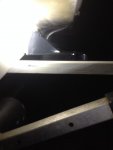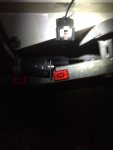MAC ATTACK
Petty Officer 2nd Class
- Joined
- Jul 4, 2010
- Messages
- 110
I have a brand new Garmin GPS740 and the Airmar P66 transom mount transducer. The problem I am having is losing my sonar (and depth if using GPS) signal when getting on plane. If I recycle the power once on plane it usually comes back. I love the set up, having both GPS speed and the tranducer wheel speed, water temp etc., but the transducer is big for a transom mount.
I relocated the Xducer about 1 inch lower into the water. The only way to change the angle in the water is with a wedge that comes with it (it does not swivel like most as it is a breakaway type mount). I set it up as I have several others, just wondering if there is anything I am missing.
Normally I fish in waters that I am familiar with, but I also fish the flats with tide changes. Getting on plane to fish different spots gets hairy when it is 3 or 4 feet of water.
It will read the bottom and depth fine at speed (35 knots).
Any advice at all would be appreciated. The transducer is located on the starboard side of the transom exactly where the old one was, and there are no hull interferences in front of it.
I relocated the Xducer about 1 inch lower into the water. The only way to change the angle in the water is with a wedge that comes with it (it does not swivel like most as it is a breakaway type mount). I set it up as I have several others, just wondering if there is anything I am missing.
Normally I fish in waters that I am familiar with, but I also fish the flats with tide changes. Getting on plane to fish different spots gets hairy when it is 3 or 4 feet of water.
It will read the bottom and depth fine at speed (35 knots).
Any advice at all would be appreciated. The transducer is located on the starboard side of the transom exactly where the old one was, and there are no hull interferences in front of it.
Last edited:





















